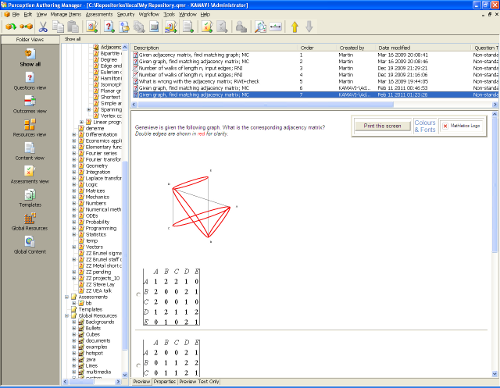Dr. Trevor Hawkes from Coventry University has submitted the following interim report for his project.
Project Title: Internet Librarian and Curator for Mathematics Videos
Proposer: Trevor Hawkes, Coventry University
Start Date: 01/08/2010
Project Aims
The main aims of the project are
- to design, create and make available for publication a pilot website to
serve as a repository providing access to carefully-evaluated and recommended videos that are freely available online and cover a range of mathematical topics supporting STEM disciplines
- an associated database to store user feedback allowing staff and students to review the recommended videos, link them to their modules, and suggest their own additions to the collection
- to illustrate the website’s functionality by populating it with the resources for just one sample topic (for instance, first-order differential equations)
The site should be made ready for testing by volunteer staff and students who will be asked to provide feedback on its effectiveness.
Summary of Progress
- Designs for the presentation and structure of the web site have been explored
- Various content management systems have been tried
- PHP and MySQL training has taken place
- Technical and pedagogic criteria for evaluating mathematical video resources
have been established and a rating system devised
- A comprehensive search for online video material related to
first-order differential equations has been carried out and the resources have been evaluated.
- Contact has been made with the team at Leicester who are doing work which
has elements in common with this project
The Background to the Current Situation
Although the project formally began on 1st August, I was on annual leave until
the beginning of September.
The sigma CETL funding came to an end in July and my post as Associate
Director of sigma was reduced from 3.5 to 2 days a week. Since my responsibilities remained much as before, my time to work on the project was initially strictly limited.
The situation improved in November when my post was extended to 3 days a
week.
I had used some personal time freed up while I was on 2 days a week to train myself in the use of PHP and MySQL with a view to writing a database back end for the interactive part of the project website.
Next I explored several content management systems (CMS) for an alternative approach; in particular, I experimented with Coventry University’s Cuba environment, which was designed as a blogging tool and had very limited potential for creating an interactive website. Subsequently, on local advice, changed to WordPress. It took the best part of two days to install the open source WordPress on our sigma server, even with the help of the Faculty’s systems administrator, an experienced Unix/Linux developer. Although WordPress had more potential than Cuba as a CMS, it was still frustratingly difficult to adapt from its primary purpose as a piece of blogging software to a
fully-functional CMS.
In view of these false starts, I have now purchased a copy of Adobe CS5 Web Premium which includes Dreamweaver, a website creation program that I have used before. The next phase of my work will be to create the website I have in mind and to connect it to a database for storing and displaying user feedback.
The eLibrary, created by a Leicester e-learning team led by David Packwood, has similar objectives to this project; it has broader scope (covering all types of online learning resources, not just videos), but has only limited information about the content and value of the recommended resources and limited functionality for user feedback. It will be interesting to compare user feedback for the two projects
Conclusions
- Personal time constraints have slowed progress with the project.
- The limited project budget precluded the possibility of buying a custom-made content management system; in any case, outsourcing would have afforded me having less control and flexibility in the final design.
- The exploration of various free and proprietary tools for creating websites has taken time and involved changes of direction. The way forward is now clear.
- The gathering and evaluation of online video resources on the specific topic of first-order differential equations has been fairly exhaustively carried out. I have been assisted in this research by members of the sigma maths support team during quiet periods of their tutorial duties. The technical, mathematical and pedagogical quality of much of what we have found is poor and only a limited selection of available resources meet the standards expected for the seal of approval as ‘recommended’ learning material.
- I am confident that I will be able to complete the project by 30th June 2011.
Trevor Hawkes, 08 February 2011



